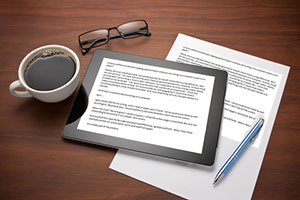
Is there a difference between reading and working on what you are writing on a computer screen or on paper?
Clearly, this is an individual choice, but speaking purely for myself, I think there is a big difference. But I am not sure why. For more than twenty years I have composed my books on a computer. It means less physical labor (and writing a novel is labor intensive). It is vastly easier to revise, change, editor, delete, and add on my computer. I do many more revisions than I used to do on a typewriter. I think that makes me produce better writing. For someone like me, with dysgraphia, it means that what is corrected (mistakes, here) remains corrected. And, not a small thing with me, the spell checker is a wonder.
All of that is a positive about working on a computer.
BUT—
I get a better feel for my writing, when I read on paper, pen in hand. I sense weaknesses faster as well as strengths. Beyond all else, I see possibilities in plot and characters I don’t see on the screen.
Why is this true? My only guess—and it is a guess—is that the written page is more book-like, and I am responding to my work as if it is a book, not a screen.
As a result of this imperfectly understood but real difference, I go back and forth. When I feel I have reached a certain on-screen point, I print and read from paper.
It is simply part of my process.
Do any of you experience this?
10 thoughts on “Paper vs Screen”
Dear Avi, Thanks for your insights. What do you think about listening to books online or taped versus reading the page or screen. Is listening to a book the same as reading print? What do you think? rob
I’d say reading is very different from listening, mainly because I tend to listen while driving, so re-reading a paragraph, flipping back some pages to check something earlier, and either marking up or taking notes are all more difficult (or well-nigh impossible, safely) with the audible book. So I think listening (in that fashion) produces less comprehension and retention than reading. On the other hand, it’s better than nothing and so for less intense books, it allows a lot of ground to be covered that may otherwise sit, un-attended, in my ever-growing “To Read” list!
Perfect timing, Avi! This long weekend, I’ll be sequestering myself in a cabin at just under 7,000 feet and going through my entire manuscript from start to finish. Of course I’ll have my laptop with me, but I will also have all 150 pages printed out and ready to go for read-alouds and pen-in-hand edits. Glad to hear this process works best for you as well.
I sound like you when it comes to the alternative ways to write. In addition to what you said, I feel like a totally different part of my brain works when I write long- hand. It’s a more artistic part of me; the words flow differently (and with more emotion) when I write out my ideas. Since it’s harder on my writing hand, I reserve writing with a pen and paper for moments when I want more personal, more heartfelt dialogue of scenes.
I might have also said that part of my process is to read my work aloud, first to my wife, and then, if I can arrange it, to a class. Teaches me a lot.
I have heard of authors having their first drafts being read to them. I’m not sure I could listen to that.
And I recently read something by Stephen King in which he suggested the BEST way to hear a literary work is to listen to it.
Indeed, there ‘s Robert Frost: “The ear is the best reader.”
Yes! For me it is very strong. Screen text is effervescent. It simply does not record in my brain as well. It’s like I see light more than text. And almost everyone prefers paper textbooks, not online. Same phenomena. And I agree with other writers, the ancient practice of speaking aloud is the best way for me to comprehend, remember and appreciate words. Nobody seems to like to say it but just because something is new does not mean it is better.
I read a book first and perhaps a year later, listen to the beautiful words and remember them longer after — all of Louise Penny’s books, James Lee Burke.….the early Mary Russell/Sherlock books. Ages later I will remember, not the outcome/who done it.…..but the cadence, the music, the intricacies of clues and hints. Reading for the story, listening for the language.
Thanks for sharing — I love hearing how you work.
Personally, I have to write on the computer because my handwriting is so slow, yet my story comes so fast (average 2k words an hour), For revising, I love using track changes in the first read-through because then I can type out my ideas and notes.
It’s surprising how much difference reading your MS on paper makes. I also like to read it on my Kindle, to get a better sense as a Reader.
I always do better editing on paper copy. I also write many notes initially by longhand. Markups just work better for me on paper with pen in hand.
I do better editing/marking problems on paper, like Bart^ and others. I also prefer to read paper books. But the marvels of revising on computer (WORD was made for writers) do not escape me. I’m almost old enough to remember revising pre-word processors… Not quite. I imagine I would have quit trying long ago if that part had to be done longhand or on a manual typewriter.